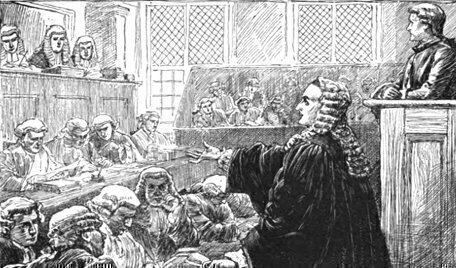On August 4, 1735, a jury acquitted publisher John Peter Zenger of libel charges against New York’s colonial governor, in an early landmark moment for the free press and the American legal system.
 Years later, Founding Father Gouverneur Morris said the verdict in Crown v. Zenger was “the germ of American freedom, the morning star of that liberty which subsequently revolutionized America!”
Years later, Founding Father Gouverneur Morris said the verdict in Crown v. Zenger was “the germ of American freedom, the morning star of that liberty which subsequently revolutionized America!”
Morris’ grandfather, Lewis Morris, was a judge in New York who co-owned the newspaper printed by Zenger, the New-York Weekly Journal. Several attorneys ran the Weekly Journal, which the young German immigrant Zenger printed at his business.
The Weekly Journal criticized the colony’s powerful governor, William Cosby, who was supported by the other newspaper in New York, the Gazette. Governor Cosby had removed Judge Morris from office after Morris issued a dissent from the bench in a case that favored Cosby. The Weekly Journal’s criticism of Cosby was unrelenting, accusing the governor of violating the “liberties and properties” of the people.
An irate Governor Cosby tried various tactics to shut down the Weekly Journal, but he was met with resistance. Two grand juries failed to indict Zenger on charges of seditious libel, which in colonial times meant criticizing the colonial government “without lawful excuse or justification.” He also tried to have copies of the Weekly Journal burned in public, but he was met with resistance from local officials.
Cosby then decided to use a legal tactic, called an “information,” to have Zenger brought before New York’s Supreme Court. Although Cosby controlled the court, a jury would have to approve of the information before Zenger could face libel charges.
During the jury proceedings, the two attorneys who published the Weekly Journal were disbarred by the court when they tried to represent Zenger. In their place, Zenger was assigned a pro-Cosby public attorney, John Chambers.
Things took a turn for the worse for Cosby on August 4, when Zenger’s former attorneys arranged for the famed colonial lawyer from Philadelphia, Andrew Hamilton, to represent Zenger in court for free along with Chambers.
At first, Chambers entered a not guilty plea for Zenger, challenging the colonial Attorney General to prove a standard of libel. Chief Judge John De Lancey then told the jury that, “The laws, in my opinion, are very clear; they cannot be admitted to justify a libel.”
Hamilton’s response became one of the signature moments in American legal history. He started off by admitting that Zenger printed the statements, but that the crown had an obligation to prove they were false statements. The tactic blocked the Attorney General from making a counter-argument, and then Hamilton appealed directly to the jury.
“The question before the Court and you, Gentlemen of the jury, is not of small or private concern. It is not the cause of one poor printer, nor of New York alone, which you are now trying. No! It may in its consequence affect every free man that lives under a British government on the main of America. It is the best cause. It is the cause of liberty,” Hamilton pleaded.
Hamilton concluded by making the argument that truth is the best defense against libel. “The laws of our country have given us a right to liberty of both exposing and opposing arbitrary power (in these parts of the world at least) by speaking and writing truth.”
The judge told the jury to ignore most of Hamilton’s statement and to only decide whether or not Zenger printed the statements. After recessing for about 10 minutes, the jury returned with a not guilty verdict, despite the judge’s instructions.
Today, the Zenger case is seen as a landmark decision that influenced the independence of attorneys, the power of juries as a counterbalance against executive powers, and the need for a free press. It also brought the term “Philadelphia Lawyer” into the American lexicon, as well as the concept of jury nullification.
Scott Bomboy is the editor in chief of the National Constitution Center.







